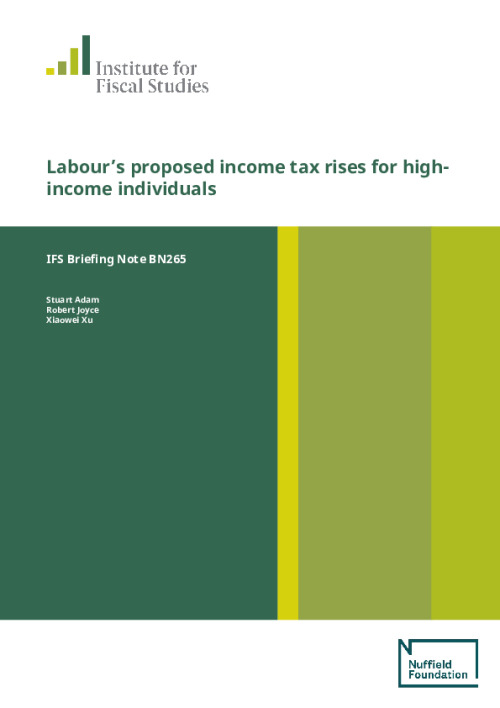The Labour Party plans to increase income tax for individuals with annual taxable incomes over £80,000. Under the current system, income tax is payable on incomes above the personal allowance of £12,500 a year. The 40% higher rate becomes payable at £50,000, and the 45% additional rate kicks in at £150,000. Labour would introduce a new 45% income tax rate starting at £80,000 a year, and a new 50% rate starting at £125,000, from 2020–21.
Key findings
- The Labour Party plans to increase income tax for 1.6 million people with taxable incomes over £80,000 a year from April 2020. This is currently the highest-income 5% of income tax payers, or the highest-income 3% of all adults.
- Losses would be greater, in cash terms, for those with higher incomes. Someone with an annual taxable income of £100,000 would lose £1,000 a year, whereas someone with an income of £150,000 would lose £5,375 a year.
- The proposals would affect ever more people over time, since the £80,000 threshold would be fixed in cash terms. In 2023–24 approximately 1.9 million people will have incomes exceeding £80,000 (24% more than in 2020–21): the top 6% of income tax payers or the top 4% of adults.
- The top 5% of income tax payers contribute half of all income tax revenues today, up from 43% just before the financial crisis. Labour’s proposal would be the latest in a series of income tax increases for high-income individuals implemented in the last decade, including the introduction of the additional rate (now 45p), the withdrawal of the personal allowance, cuts in income tax relief for private pension contributions and real-terms reductions in the higher-rate threshold.
- The tax revenue that Labour’s proposals would raise is highly uncertain, and depends on the extent to which people reduce their taxable incomes in response to the rise in income tax. If no one changed their behaviour, the tax rises would raise around £10 billion per year on average between 2020–21 and 2023–24. Given existing evidence on how the affected group responds, a reasonable central estimate for the revenue raised is around £3 billion per year, but it is also plausible that it could raise £6 billion or that it could reduce revenue by £1 billion. All else equal, people would respond less to the tax rise if avoidance opportunities were fewer, so introducing other measures as well might affect the amount it would raise.











